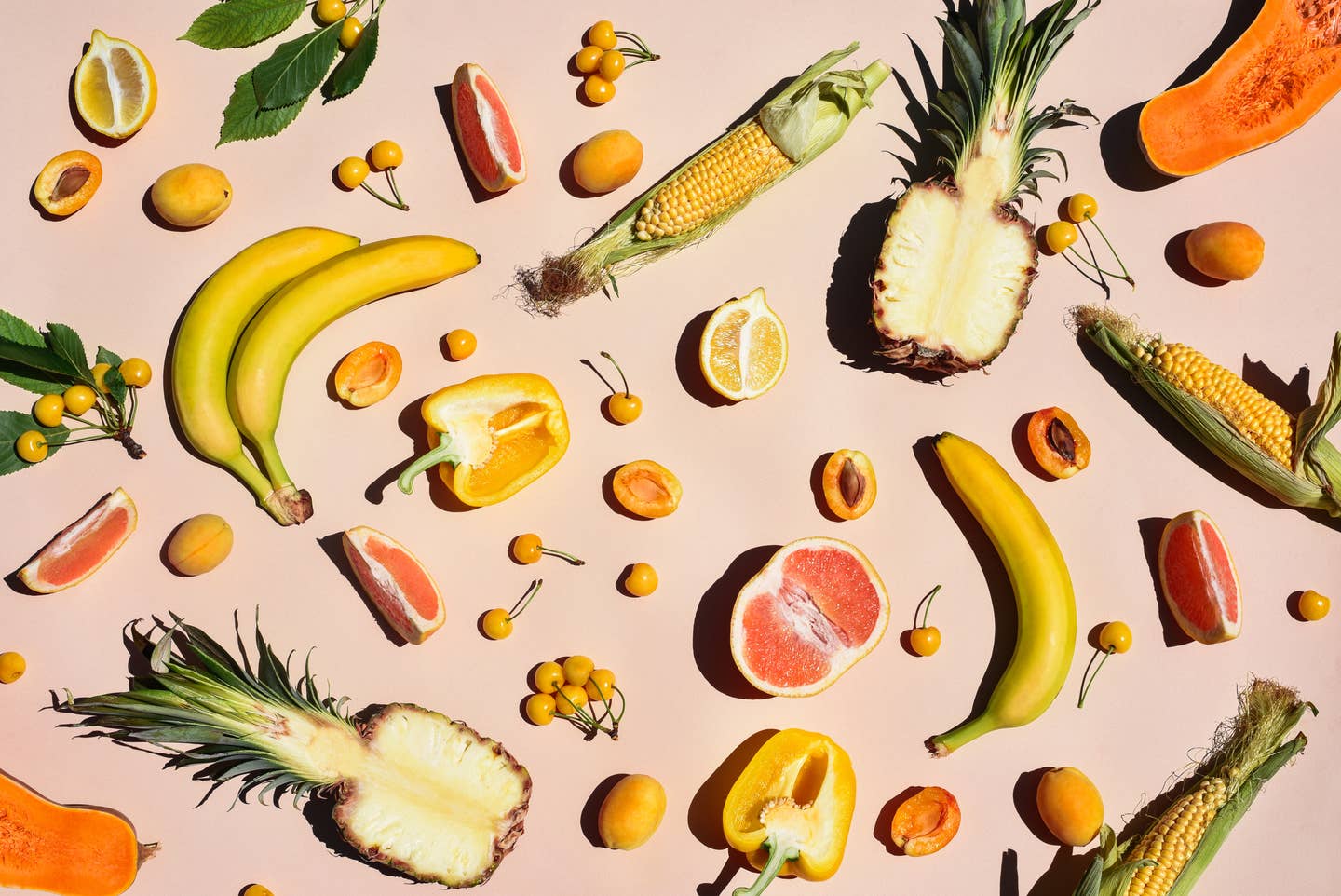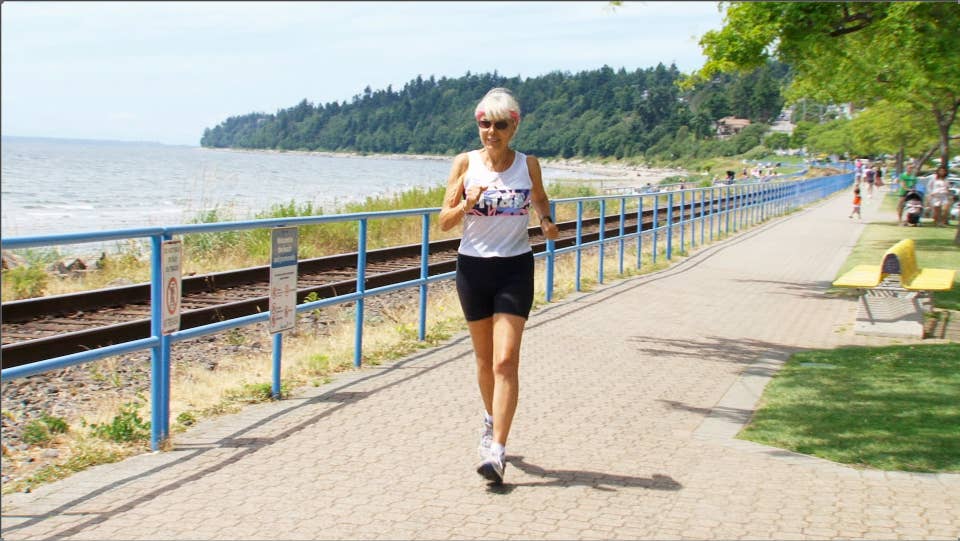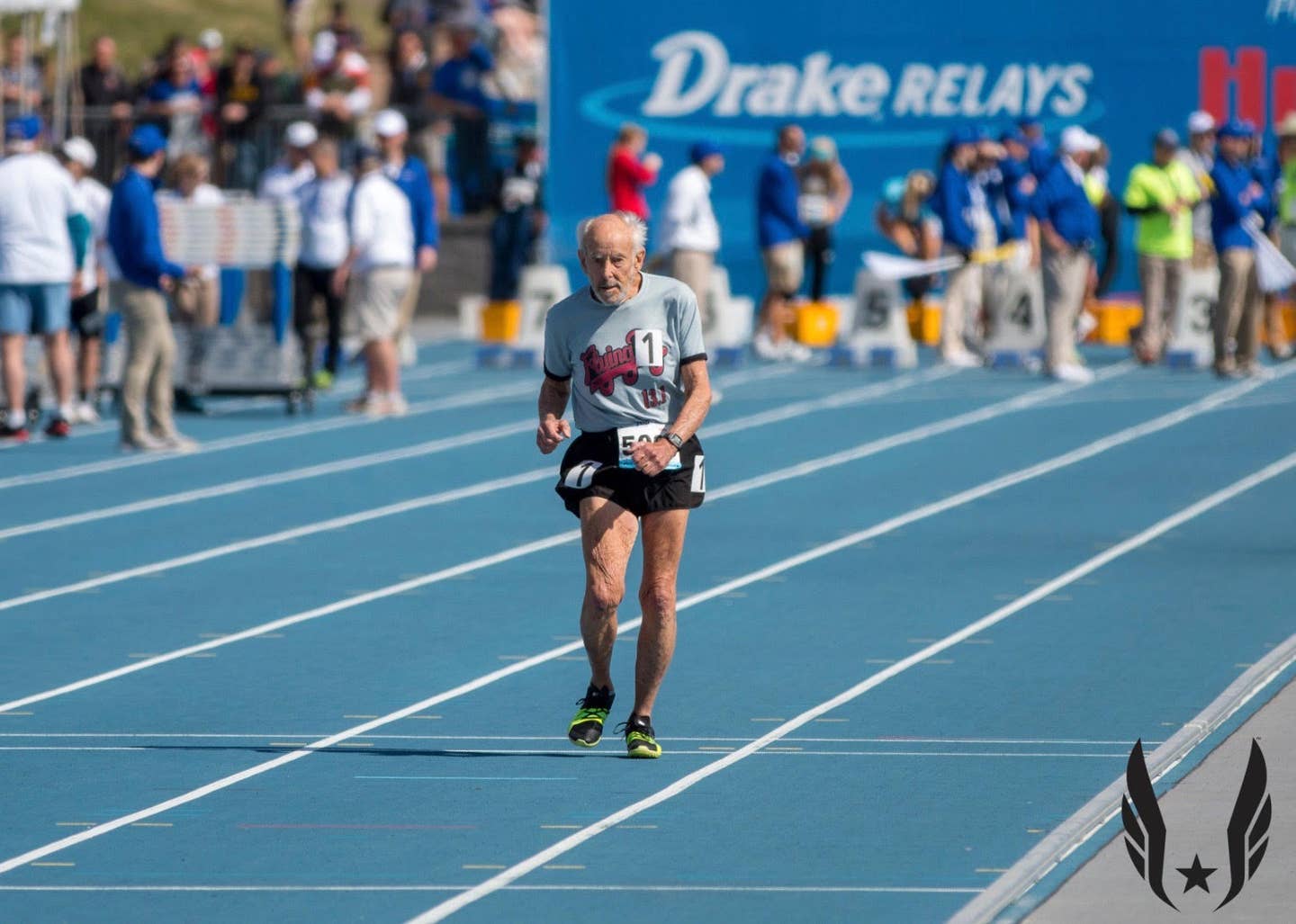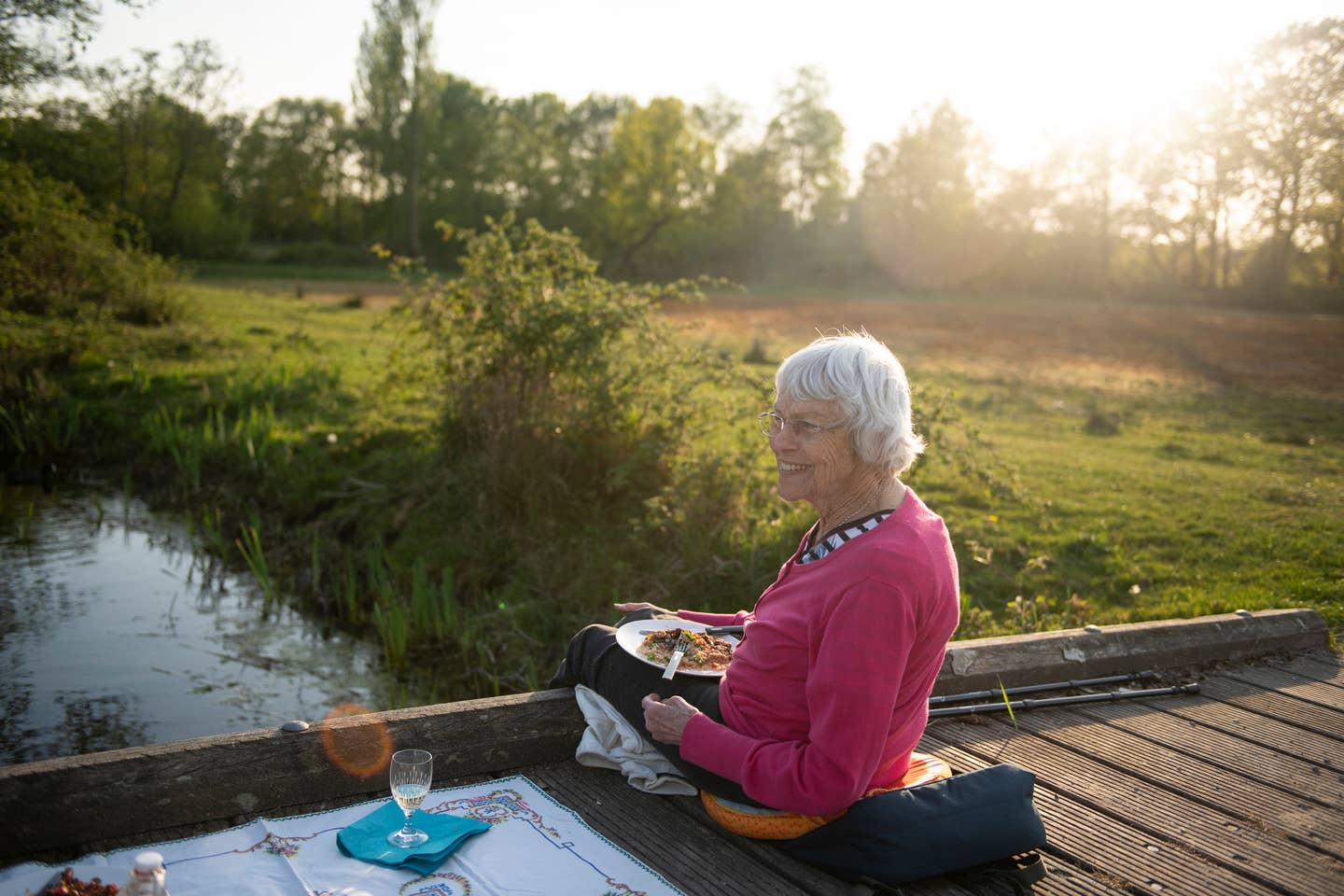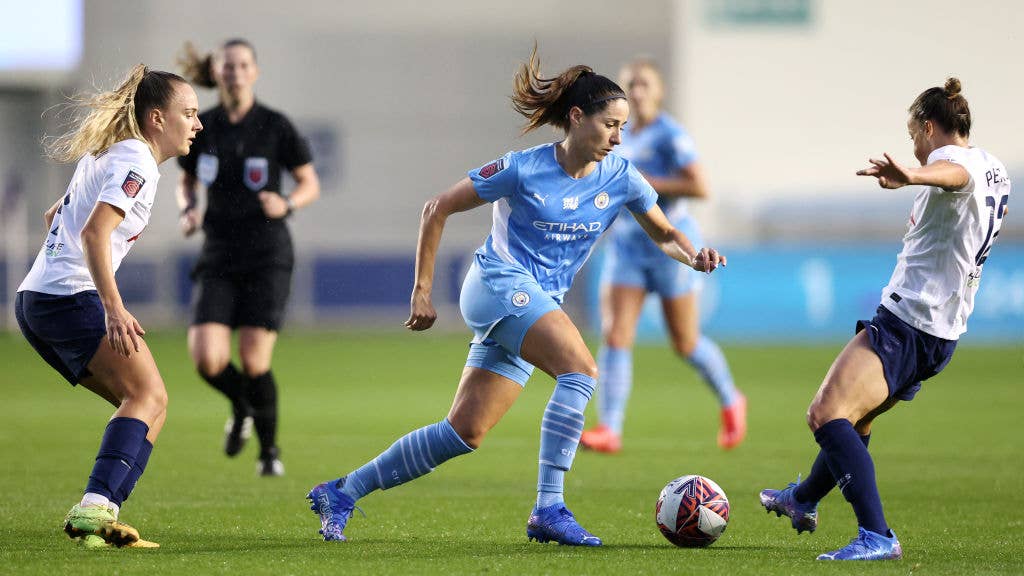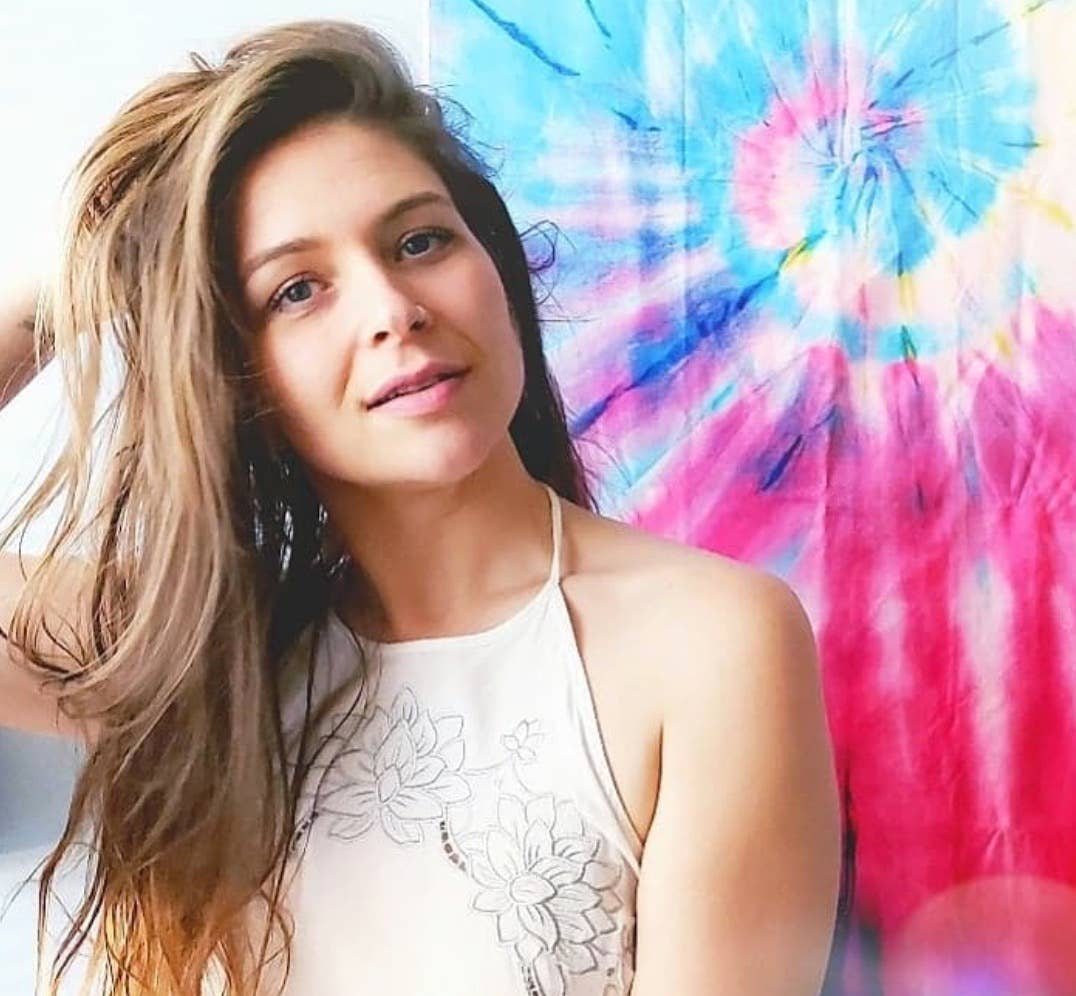
This Woman Changed Her Relationship with Food, Lost 100 Lbs and “Found Joy”
Aidy Acres Rogers tried every diet under the sun to lose weight and feel like herself again. She counted her points on Weight Watchers, tried the Military Diet, and felt like a failure as the extra weight stayed on, and began to impact her mental health. She couldn't see the light until one day, watching TV, sipping on a can of soda while eating a bag of Cheetos, a PBS special featuring Dr. Joel Furham came on based on his book Eat to Live. Furhman, who advocates for a plant-based lifestyle, was talking about the physical and mental benefits of eating mostly whole plant-based foods: Fruits, vegetables, whole grains, legumes, nuts, and seeds. He made it look easy. After feeling let down by conventional diets in the past, Aidy was curious. She loved the idea of eating this way because it was a lifestyle and not a diet. So, little by little she began to eat cleaner: She limited her meat and dairy consumption, cut out processed foods, gave up alcohol completely, and had more energy after the first week and lost a total of 100 pounds.
Without even going "fully" plant-based or vegan, and encouraged by the rapid weight loss results, Aidy had what she now calls a spiritual awakening: She knew it was time to ditch the meat and dairy altogether and once she did, more weight fell off: After weeks of eating a totally plant-based diet, she was hooked. In six months she lost a total of 60 pounds. "I lost weight, but more importantly, I healed my relationship with food and with myself," Aidy recalls now. Instead of restricting what she ate, as most diets require, "I could just eat real food and when I did, I started loving myself again.” The mental benefits were as real to her as the physical ones: "I would say that on a vegan diet I found and created the happiness that was always inside of me, that was masked with all the junk food, animal products, chemicals, cigarettes, and alcohol."
The Beet chatted with Aidy Acres Rogers over Zoom this week and learned about how her experience could help others ditch the dairy and meat that held her down for so long. If she can do it, others can too, since she grew up on a farm and it was normal for her family to slaughter animals to either sell or eat for dinner. Her biggest challenge was getting over this with her family.
Now Aidy shares her successes with anyone who wants to be inspired. She has since helped her aunt eat vegan and overcome the challenges she had with weight and energy and she decided the best thing is to share how to do it with others who are eager to start their plant-based eating lifestyle and choose a healthier path.
Learn about the food Aidy ate to drop the pounds, believe in herself again, and find out the helpful advice she shares exclusively to The Beet.
The Beet: How long have you been vegan?
AR: "I wish I had an actual day to have a “vegan anniversary,” but there’s no actual day. The year was 2016. I was mostly vegan before that, I ate a whole-foods plant-based diet for three years before that."
The Beet: Why did you go vegan or plant-based?
AR: "Before I was vegan, I always was on a diet. I tried every diet you could think of: The fads, the magazine diets, the military diets, the points [on Weight Watchers]. I was trying to lose weight in any way I could. Then, I saw a special on PBS based on the book Eat to Live, by Doctor Joel Fuhrman, which taught me about a plant-based lifestyle. It was a vegan approach to a whole food plant-based lifestyle, where you focus on micronutrient density and fill up on salads, and stir-fries and soups, and eat black-bean brownies to feel satisfied. I felt this abundance come through my TV screen, and I had never thought of diets as 'abundant' before.
"I saw all these people with weight effortlessly dropping off, and what they claimed to be working as a vegan diet, and I said to myself, 'Let me check this out, this sounds kind of exciting.' On the other hand, I was also upset that no one was talking about this. I had never heard about this [veganism] before in all of the diets I tried and failed."
The Beet: So your first reason to go plant-based was to lose weight. Did anything else change?
Aidy: "That was the main one, but I really don’t like talking about weight loss anymore. I did in the first part of my journey, and now it's less about that. Because there’s this thin image that society leaves everyone wanting, so at first I did want that life. But as I got years into this journey, I understood that it’s about what’s underneath the weight loss.
"So yes, it was a goal for me at first, but then I realized that was just going to be a result, and I began to think about what were some of my other goals. I wanted to live healthily, I wanted to not struggle to breathe when I got upstairs, or struggle when I was tying my shoes, so it was all those things that really started to show up to me. The weight was just kind of coming [naturally as I ate the way] so I began to be able to focus on the other stuff. The weight loss was what got me into it, but it wasn’t the only thing I eventually focused on."
The Beet: What were some of the challenges you faced when you went vegan?
AR: "So I actually grew up on a pig farm. I actually have nightmares about it. I grew up on a pig farm for most of my life so my family was not accepting of my new diet, and they were still talking about how animals are considered food. I mentioned how unnecessary and mean it is to kill animals for no reason and my family had a hard time hearing that because it's all they’ve ever known. So that was really hard. They still have the farm and I haven’t been to there in two and a half years."
The Beet: Is your family willing to try plant-based foods or are they resistant to adapting to your new lifestyle?
AR: "At first, it was tough because my family tends to be jokesters, so there were a lot of conversations where they didn’t actually try to include me, but just poked fun at my new way of eating. But once I started to stand up for myself and started bringing food to share with them, I wasn’t just the “new vegan girl at dinner” with no food to eat.
"I started making food for everybody. I brought a whole pan of black bean brownies. They loved it. And now, a lot of my family members are vegan, or at least mostly plant-based, and others are trying to make the switch. It’s interesting to see. My aunt [my dad’s sister] is vegan now; she started out mostly plant-based and then cut out meat and dairy completely, so she and I now bring all the healthy stuff to dinner. It’s hard for her too, because her brother has a pig farm and is bringing meat to the holiday dinner, but we bring the plant-based entrees."
The Beet: How did you inspire your aunt to go vegan?
AR: "She and I are similar in a lot of ways. She makes a lot of posts about me. She saw how I was so vocal about my own journey, I posted a lot of stuff to Facebook, I shared recipes, I said how I was feeling, and just by her watching those, not even interacting me on a one on one level, she was inspired to make the switch. She saw that I was much lighter now, not only physically but joyfully.
"My energy was better, my skin was clearer. There was one-holiday gathering when I walked in and my grandmother didn’t even recognize me–because my diet had changed my appearance for the better. I think people saw this drastic change from holiday to holiday, with months in between, and I was really losing quite a lot of weight, without even really trying to. I was just eating plant foods, and I had a lot of extra weight to lose, so I lost the weight effortlessly because of my intentions of focusing on eating plant foods."
The Beet: And did your aunt lose any weight?
AR: "Yes, she lost like, 50 pounds. After going vegan, she discovered she loves working out and pairing strength training with this lifestyle. Whereas I’m really more 'flowy' since I’m an intuitive dancer, and that’s really all I do for working out. But she’s really into weight lifting, which just goes to show that this lifestyle can work for anybody, but you have to adjust it to you."
The Beet: Is she the only one in your family who's inclined to eat plant-based, or have you helped other people?
AR: "There are actually a lot of people who I've helped. My aunt's son is now vegan, his wife is vegan, and her daughter is plant-based, as well as her step-daughter, who is recovering from cancer. Something I learned is that people are watching, even if they were one of the ones to poke fun or make comments. But people are watching what you do, how you treat other people, and how we treat ourselves. I think spending time in person with them after they saw everything on social media, was really impactful,l since they see that I'm happier."
The Beet: Has veganism changed your family dynamic?
AR: "Yes, and it’s really cool. Our family generally likes to comfort themselves with food, and we can still eat these comfort foods on a plant-based diet. We don’t have to be just these sad lettuce eaters in the corner. We can still be joyous eaters with our pumpkin caramel dip. We can still share all of the foods we loved. I like to do vegan whole-food versions of classic family favorites, not to out-do their dishes, but to add another option and share the love. That was tough for me at family dinners; I didn’t want to bring a dish that was trying to be better than anyone else’s, I’m just trying to share my dish too."
The Beet: How did you make the switch? Was it a slow transition or did you just jump right into it?
AR: "It was a slow transition. At first, I lost some weight when I gave up alcohol, candy, and chips, and all of the obvious kinds of junk food. I was still eating lean-meats and fat-free cheeses, stuff like that. Then, it was that documentary that really helped me make the switch to live an even healthier lifestyle. I realized I could make ice-cream out of bananas, and thought," How Cool!” Then I didn’t have to worry about things like checking labels and looking for chemicals, all kinds of stuff. I said to myself, "I could clean my diet in other areas, like cutting out meat and dairy." So for the first couple of years, I would say that 98% of the time, my diet was all plant-based foods. Then, a couple of years in, I was like I’m done with all these animal products. Never again."
The Beet: So in that first year when you were still eating meat, how much weight did you lose?
AR: "When I was still eating meat, but cut out the processed food and alcohol, I probably lost 50 to 60 pounds. Then when I decided to eat completely vegan, and I lost another 30 pounds that year. Then I woke up and had a spiritual approach to my plant-based diet, and lost another 30 pounds in years to follow. So, I went from 223+ pounds to about 135 pounds.
So I’ve lost a total of 100 pounds altogether. It’s a whole new world, I felt like I had a whole new body too."
The Beet: What did your diet consist of? What did your meals look like?
AR: "I talk about these two things all the time when people ask me the same questions. People are always so excited to hear about my fudgy, black-bean brownies, and my loaded veggie chili with goji-berries. The berries add a sweet and spicy chili flavor, and the rest of the bowl is loaded with veggies. I remember making huge batches of both of those things, and putting them into the fridge and waking up being like, “yes!” I was just so excited about this food, because like I said, I was filling up to nourish my body. I didn’t only have to have just one brownie, I had two or three for breakfast because it was filled with beans, sweet potatoes, bananas, and kale, with cacao and dates as a sweetener. It was so pure and so whole, and I didn’t have to feel bad about it anymore. I didn’t have to restrict myself, I could just eat food. I started loving myself again."
The Beet: I love the idea of brownies for breakfast. What about lunch?
AR: "Because salad is the main dish in the documentary, Eat to Live, I was like “I got to load up these salads. What do I love?” I love tacos, great, I’m going to make a taco salad. I’m going to take everything I love in tacos and put it over a bed of greens." I started to play with a reverse-salad mentality, of taking what I like and making it into a salad, instead of starting with lettuce and thinking of what to put on top. I love to fill up on big salads that have a ton of stuff in them and use different textures, dressings, and sauces."
The Beet: What kind of plant-based protein do you top your salads with?
AR: "I love beans as one of the main sources of protein. I do a lot of organic soy. I love organic soy curls because they’re the least processed meat replacement. Then, I just load up on veggies. Nuts and seeds, veggies, beans, whole-grains, root vegetables."
The Beet: What are some of those traditional dishes you were able to re-create?
AR: "A lot of the holiday ones. There was a green bean casserole that was really fun and easy. I used mushroom gravy and sauteed onions on the top. One of the dishes I re-created, and I actually like to say that it was "inspired by" because it’s really not that close, but it's inspired by the same flavors in this bread dish called Kolac. The traditional dish is bread with cottage or ricotta cheese on the top, and it’s made sweet, with butter and cream, so it’s pretty much full of refined sugar and dairy. But I made it with whole-grain, cinnamon sprouted bread and soaked chia seeds. I made a flax egg, instead of using real eggs, and then It tasted almost like French toast, And while it wasn't an exact recreation everyone enjoyed just as much. That’s nice too, it’s almost like here’s this version and here’s the original version. And now when I go home, people will leave the butter out of the corn now, so we have the choice: Here’s some corn with butter, and here’s some corn without butter. It’s really nice to feel like they are thinking this way. It's inclusion."
The Beet: What’s the biggest impact veganism has had on your life?
AR: "For me, veganism helped me open the door to a more spiritual side of myself. It started once I reduced the animal products, and once the animal products left my body, wherever that stuff gets flushed out, through your cells or blood, essentially it's like dead energy was leaving my body.
"I was filled with all this energy that I hadn’t been able to access before, even though it had been years since I’d been living a whole food plant-based lifestyle. Just by cutting out the remaining animal products: Boom! I awakened more to myself and realized I was still beating myself up in my head and I was still judging people, which meant I was really just judging myself for those things. So I came into my own self and was able to identify other important parts of my journey and express this side of my compassionate lifestyle.
"I realize I wasn’t being compassionate to myself, and I wasn’t really living my authentic truth. I wasn’t really living my whole truth, for lack of a better word. It was a more spiritual awakening and the beginning of a more authentic life for me. I started dancing, I started painting, I remembered who I was."
The Beet: What advice do you have for anyone starting their plant-based journey?
Aidy: "Release the pressure of having to look perfect or have it all go a certain way. Or having to follow a certain way of vegan eating. There are so many different approaches. Some doctors recommend starch, some suggest salads, some really like juicing, some say don’t eat after 6. It really doesn't matter, eat plants, release the pressure, find what feels good for you and stick with it."
The Beet: Do you have a mantra?
Aidy: "I really like the perspective that time is not real, from a metaphysical perspective. It’s how I healed a lot of my past self-shame and guilt and regret. If I loved myself five minutes ago, shouldn't that apply to myself five years ago, ten years ago, when I was still beating myself up after eating family-sized bags of Cheetos? It really helped me to look at my past self as someone who was doing her best and needed to go through those experiences to feel what I feel now.
"I can't be mad at myself for eating all those family-sized bags of Cheetos and crying in a closet, I have to hold her and love her. That’s me! If I want to feel better now, I can’t hold on to the negative feelings towards the past version of my self, that’s me right now. It really helped me to view it like that, that it’s all me, and the future version of myself, I can be her in two seconds. That’s it, then I'm there.
"That really helped me: that you don’t have to wait in order to feel good. You don’t have to wait in order to be happy."
More From The Beet

